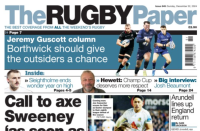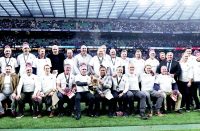 I am rather surprised by some people’s reactions to the reasons why England‘s young team failed to make the right choices in last week’s game against Australia. Clive Woodward was right to point out that international rugby brutally exposes the slightest errors in judgement which can make the difference between a sensational win and a disappointing loss and it is up to the coaches to try and eradicate them by running through a number of scenarios during training.
I am rather surprised by some people’s reactions to the reasons why England‘s young team failed to make the right choices in last week’s game against Australia. Clive Woodward was right to point out that international rugby brutally exposes the slightest errors in judgement which can make the difference between a sensational win and a disappointing loss and it is up to the coaches to try and eradicate them by running through a number of scenarios during training.
Despite the criticism from a few past players and coaches this group of players have done nothing different to those of the past.
Back in the early Eighties Woodward the player wandered off-side to deny England a rare win over the all-conquering Welsh, just as, in the Geoff Cooke era, we as a team made mistakes that threw away a Grand Slam in 1990 and the World Cup final in 1991.
Even the World Cup-winning management and coaching team of 2003 must regret the missed Grand Slams and Championships that the team failed to win in the previous six-year build-up to their only Grand Slam and that final!
As a squad comes together it takes time for them to gel and achieve that collective understanding of what to do and when to do it, which is especially important when choosing whether or not to take a kick at goal.
For, just as kicking for the corner and failing to score the try can give a boost to the opposition, so does a kicker failing to hit the spot.
The impact on the confidence of the Scotland team and fans when Gavin Hastings inexplicably missed a penalty from virtually in front of the posts in the semi final of the 1991 World Cup was palpable and I have no doubt helped us go on to win that game.
Just as our failure to take the points in 1990 when camped on the Scotland line for a series of scrums and penalties eventually led to us losing – but as that occasion proves, sometimes the right decision can be wrong.
England had won a scrum five metres out from the Scottish line and, as we attacked the Scottish scrum it collapsed, and New Zealand referee David Bishop awarded England the penalty. Captain Will Carling came and asked pack leader Brian Moore if we forwards wanted to scrum again or kick the penalty.
As a pack we were confident we had the edge on beating the Scottish pack, so elected to scrum again, but once again the scrum went down.
Bishop consulted with his touch judge, Welsh referee Les Peard, who told him that the Scottish loose-head and captain, David Sole, was the player at fault on both occasions. Bishop came to the scrum, warned Sole and awarded another penalty to England, and, as both front rows set, Bishop told Sole that if he collapsed again it would be a penalty try. Sole, under pressure, went down anyway and to our surprise the referee just reiterated his warning and gave another penalty.
That happened three times with Bishop reiterating his warning again and again, saying: “I’ve told you if you collapse again it will be a penalty try” but each time he failed to award it and at the fifth scrum the ball bobbled out and it was hacked down the field relieving the pressure on Sole and the rest of the Scottish team.
Fair play to Sole – he took a gamble and it paid off, Scotland won the match and a Grand Slam, whereas we not only lost the match but had to endure the media frenzy questioning our decision on the field with some even accusing Moore of overriding Carling’s call to kick the points (which was untrue).
We knew we had the power to score from the scrum and, given the continual assurance from the referee that he would award a penalty try if the Scots cheated to prevent it, we made a collective decision to go for the try and failed. But was that the wrong decision?
With hindsight it would seem to be obviously the wrong choice because we lost the match but who knows if Simon Hodgkinson would have got the kick, particularly as the wind was really strong that day and as the final score was 13-7, a kick would not have been enough to have won the game anyway.
As a squad we went on to win back to back Grand slams (1991and 1992) an achievement that has not been matched by any of the other home nations in living memory – and yet after the first Grand Slam we threw away a World Cup final by some individuals making decisions to change tactics without letting the rest of us know!
We had reached the final by playing a particular style that was changed on the pitch by our playmakers (leaders) without consultation with the other players.
At half-time Mike Teague questioned what we were doing and was told that despite the fact we hadn’t trained for it, it was working and we would win. But we didn’t and many of us still rue the fact we were not asked how we should play.
The current squad are sharing a collective responsibility for on-field decisions win or lose. Hopefully, come the final in 2015, they will keep doing the same.






















